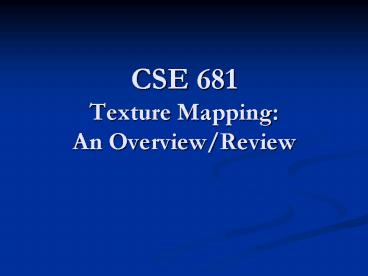CSE 681 Texture Mapping: An OverviewReview - PowerPoint PPT Presentation
1 / 21
Title:
CSE 681 Texture Mapping: An OverviewReview
Description:
Map onto untransformed surfaces ... Map the intersection point of the visible surface to object space. Map to texture space ... Map the texture onto a simple ... – PowerPoint PPT presentation
Number of Views:51
Avg rating:3.0/5.0
Title: CSE 681 Texture Mapping: An OverviewReview
1
CSE 681Texture Mapping An Overview/Review
2
Why Textures?
- How can we model this scene with polygons?
- Lots of detail means lots of polygons to render
- 100s, 1000s, Millions of polygons!
- Modelling is very difficult and cumbersome
3
Why Textures?
- Render a single polygon with a picture of a brick
wall mapped to it?
4
The Quest for Visual Realism
5
Textures
- Phong lighting just wont do
- Plastic, rubber, or metallic looking objects
- Add surface detail with real world patterns and
images - We get modelled detail at a low cost
- Very useful in games a billion dollar industry
- Provides realism at a low cost
- Graphics hardware vendors work hard to optimize
texture mapping
6
Terminology
- Texture An array of values
- 2D (most common), 1D, and 3D
- Color, alpha, depth, and even normals
- Texel A single array element
- Texture Mapping The process of relating texture
to geometry
7
Texture Sources
- Pixel maps (bitmaps)
- Load from an image file gif, jpg, tiff, ppm,
etc. - Procedural textures
- Program generated texel values
8
Procedural Textures
- Checkerboard texture with 8 x 8 texels for each
box
RGB checkerboard(int rows, int cols) pixel
new RGB(3 rows cols) long index 0 for
(int i 0 i lt rows i) for (int j 0
j lt cols j) texelindex.red 1.
texelindex.green 1.
texelindex.blue 1.
index 0 for (i 0 i lt rows i) for
(j 0 j lt cols j) if (((i/8)
(j/8))2) 0) texelindex.green 0.
texelindex.blue 0.
9
Texture Mapping
- How do we apply a texture onto an object?
- Construct a mapping between the texture and
object - Use the texture to lookup surface attributes
10
Texture Mapping
- Problems
- The texture and object are in two different
spaces - Where in the rendering pipeline do we specify
this mapping? - Object or world space?
- Map onto untransformed surfaces
- Texture filtering A point on the surface maps to
a location between texels in the texture
11
Texture Space
- A texture is defined in a normalized space
- 2D textures (s, t) ? 0 1, 0 1
- Some times (u, v) is used also
12
Texture Value Lookup/Filtering
- Normalized space is continuous but the texture is
a discrete array - Texel values are located on a cartesian grid
(1,1)
Index (s, t) may not land on a grid value
(0.25,0)
(0.5,0)
(0.75,0)
(0,0)
(1,0)
13
Raytracing a Textured Object
- Shoot ray
- Map the intersection point of the visible surface
to object space - Map to texture space
- Filter the texture
- Determine pixel color with retrieved texture
information
Eye or World
World to Object
Object to Texture
14
Map 2D Textures To Objects
- Define mapping between object and texture spaces
- For example, a simple quad in object space is
easy! - Akin to wall papering or gift wrapping
15
Mapping 2D Textures To Objects
16
2D Texture Mapping Approaches
- Intermediate Mapping
- Map the texture onto a simple intermediate
surface - Map the intermediate surface to the final object
- Intermediate objects
- Plane
- Sphere
- Cylinder
- Cube
17
Planar Mapping
Project to an axial plane, e.g. drop z coord
(s,t) (x, y)
18
Spherical Mapping
Mapping Polar (u, v) coordinates
19
Cylindrical Mapping
Mapping Cylindrical (u, v) coordinates
20
Cube Mapping
21
Intermediate Mapping
Paul Bourke































